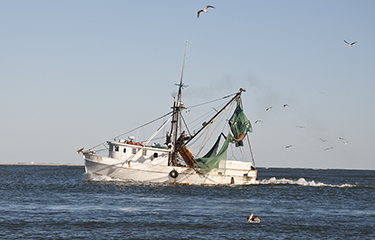Court sides with North Carolina shrimpers on Clean Water Act

The Fourth Circuit Court of Appeals has ruled in favor of North Carolina shrimp fishermen, who had been accused of violating the Clean Water Act by discarding bycatch at sea.
“This is a huge win for all fishermen, commercial and recreational,” North Carolina Fisheries Association Executive Director Glenn Skinner said. “If the courts had decided with Mr. Joseph Albea and the Coastal Fisheries Reform Group, the results would have been devastating for both sectors.”
In 2020, conservation advocates NC Fisheries Reform Group filed a lawsuit against multiple shrimpers, alleging that their practices of discharging bycatch into the ocean and disturbing sediment with trawl nets violated the Clean Water Act. The 1972 law prohibits discharging pollutants into the “waters of the United States.”
A district court dismissed the lawsuit in 2021, but the group appealed the case to the Fourth Circuit Court of Appeals. This week, the appeals court affirmed the lower court’s ruling, once again dismissing the lawsuit.
In his opinion, Judge Julius Richardson said the NC Fisheries Reform Group’s interpretation of the Clean Water Act would “vastly expand the EPA’s regulatory authority in a way that would upset the federal-state balance.”
The judge also drew comparisons between commercial shrimpers discarding bycatch and recreational fishermen engaging in catch and release practices, suggesting that NC Fisheries Reform Groups’ interpretation would make both criminal activities.
“The act forbids the unpermitted discharge of a pollutant,” Richardson. “Returning bycatch to the ocean is not discharging a pollutant, so throwing it overboard without a permit is not forbidden by the act.”
The court also affirmed that sediment kicked up from trawl nets does not count as pollution as it is not technically the same as dredging and does not add pollutants to the water.
The fourth circuit’s decision comes after the United States Supreme Court drastically rolled back the U.S. Environmental Protection Agency’s authority under the Clean Water Act. In its 9-0 ruling, the court determined that the Clean Water Act does not apply to wetlands unless they are indistinguishable from “waters of the United States.”
Environmental groups and the administration of U.S. President Joe Biden condemned the ruling, claiming that the court had taken away an important tool used by communities to protect waterways and fish.
“The Supreme Court’s disappointing decision in Sackett v. EPA will take our country backwards,” Biden said in a statement. “It puts our nation’s wetlands – and the rivers, streams, lakes, and ponds connected to them – at risk of pollution and destruction, jeopardizing the sources of clean water that millions of American families, farmers, and businesses rely on.”
Photo courtesy of Shutterstock / Brooke Becker






Share